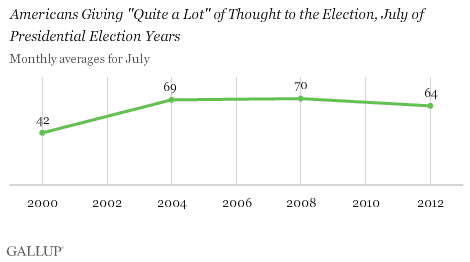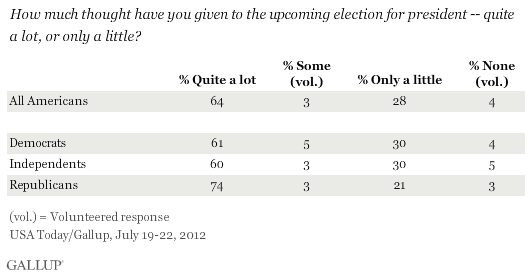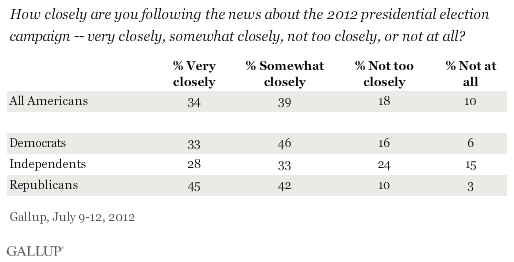PRINCETON, NJ -- Sixty-four percent of Americans say they have given quite a lot of thought to the 2012 presidential election, a slightly lower percentage than Gallup measured in July of 2004 and 2008. But Americans are much more engaged in the current election than in the 2000 election.

"Thought given to the election" is one of Gallup's "likely voter" questions, and is a predictor of voter turnout. The current data, from a July 19-22 USA Today/Gallup poll, would suggest that voter turnout among the voting-age population will be lower in 2012 than it was in 2004 (55%) and 2008 (57%), but higher than in the 2000 election (51%).
The percentage of Americans thinking about the election typically increases over the course of the campaign; thus, more Americans should be paying attention to the election during the party conventions, debates, and final push to Election Day.
Currently, Republicans are significantly more likely than Democrats to say they are thinking a lot about the election.

In most prior election campaigns, Republicans have typically paid a higher level of attention to the election than Democrats. However, the current 13-point Republican advantage is larger than Gallup has measured in recent presidential election years.
That may be because Republicans had a competitive nomination contest this year, while on the Democratic side, President Obama was not challenged for the nomination. In the early part of 2008, when Democrats had a prolonged and competitive nomination contest between Obama and Hillary Clinton, Democrats led Republicans in thought given to the election.
Thought among Democrats will likely pick up at the first major Democratic event in the campaign, the Democratic convention in early September.
Americans Paying More Attention to Campaign Than to Other News Events
A separate question aimed at gauging voter interest in the election, asked in a July 9-12 Gallup poll, finds roughly 7 in 10 Americans saying they are following news about the 2012 presidential election very (34%) or somewhat (39%) closely.
Gallup does not have a trend on this question from prior election years. However, it has asked the question about more than 200 separate news events since 1991. The 73% paying close attention to the 2012 campaign ranks in the upper third of these historical news events. The historical average is 61%.
Thus, it appears Americans in general pay more attention to election campaigns than to typical news stories, even when the percentage giving a lot of thought to the election is down from prior years.
The "closely follow" question also shows a party difference, with 87% of Republicans and 79% of Democrats saying they are following news of the election closely. The party gap is even greater among those paying very close attention -- 45% vs. 33%, respectively.

Implications
Americans are not as engaged in the 2012 election as they were in the 2004 and 2008 elections at similar points in the campaign, but they do seem to pay more attention to election campaigns than to most news stories.
Republicans currently are more highly engaged in the campaign than Democrats. If that persists, it suggests Republican turnout may be much stronger than Democratic turnout. However, Democrats may not have had as much reason to tune in to the campaign yet, given that most of the news has centered on the Republican nomination. Thought given to the election in September, after the party conventions are held, and in the final stretch of the campaign in October will give a better indication of potential turnout among party groups.
Survey Methods
Results for this USA Today/Gallup poll are based on telephone interviews conducted July 19-22, 2012, with a random sample of 1,030 adults, aged 18 and older, living in all 50 U.S. states and the District of Columbia.
Results for the Gallup poll are based on telephone interviews conducted July 9-12, 2012, with a random sample of 1,014 adults, aged 18 and older, living in all 50 U.S. states and the District of Columbia.
For results based on these total samples of national adults, one can say with 95% confidence that the maximum margin of sampling error is ±4 percentage points.
Interviews are conducted with respondents on landline telephones and cellular phones, with interviews conducted in Spanish for respondents who are primarily Spanish-speaking. Each sample includes a minimum quota of 400 cell phone respondents and 600 landline respondents per 1,000 national adults, with additional minimum quotas among landline respondents by region. Landline telephone numbers are chosen at random among listed telephone numbers. Cell phone numbers are selected using random-digit-dial methods. Landline respondents are chosen at random within each household on the basis of which member had the most recent birthday.
Samples are weighted by gender, age, race, Hispanic ethnicity, education, region, adults in the household, and phone status (cell phone only/landline only/both, cell phone mostly, and having an unlisted landline number). Demographic weighting targets are based on the March 2011 Current Population Survey figures for the aged 18 and older non-institutionalized population living in U.S. telephone households. All reported margins of sampling error include the computed design effects for weighting and sample design.
View methodology, full question results, and trend data.
In addition to sampling error, question wording and practical difficulties in conducting surveys can introduce error or bias into the findings of public opinion polls.
For more details on Gallup's polling methodology, visit www.gallup.com.
